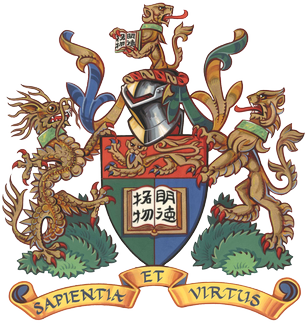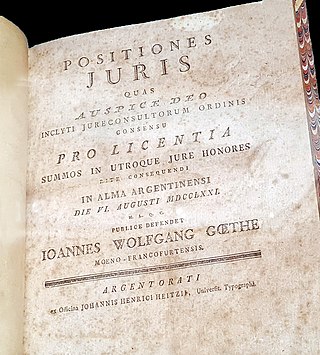
A general practitioner (GP) or family physician is a doctor who is a consultant in general practice.

The University of Hong Kong (HKU) is a public research university in Pokfulam, Hong Kong. It was founded in 1887 as the Hong Kong College of Medicine for Chinese by the London Missionary Society and formally established as the University of Hong Kong in 1911. It is the oldest tertiary institution in Hong Kong.
A Doctor of Medicine is a medical degree, the meaning of which varies between different jurisdictions. In the United States, and some other countries, the M.D. denotes a professional degree of physician. This generally arose because many in 18th-century medical professions trained in Scotland, which used the M.D. degree nomenclature. In England, however, Bachelor of Medicine, Bachelor of Surgery (M.B.B.S.) was used: in the 19th century, it became the standard in Scotland too. Thus, in the United Kingdom, Ireland and other countries, the M.D. is a research doctorate, honorary doctorate or applied clinical degree restricted to those who already hold a professional degree (Bachelor's/Master's/Doctoral) in medicine. In those countries, the equivalent professional degree to the North American, and some others' usage of M.D. is still typically titled Bachelor of Medicine, Bachelor of Surgery.
A medical school is a tertiary educational institution, professional school, or forms a part of such an institution, that teaches medicine, and awards a professional degree for physicians. Such medical degrees include the Bachelor of Medicine, Bachelor of Surgery, Master of Medicine, Doctor of Medicine (MD), or Doctor of Osteopathic Medicine (DO). Many medical schools offer additional degrees, such as a Doctor of Philosophy (PhD), master's degree (MSc) or other post-secondary education.
A Bachelor of Medicine, Bachelor of Surgery is a medical degree granted by medical schools or universities in countries that adhere to the United Kingdom's higher education tradition. Despite the historical distinction in nomenclature, these degrees are typically combined and conferred together. This degree is usually awarded as an undergraduate degree, but it can also be awarded at graduate-level medical institutions. The typical duration for completion is five to six years.

A licentiate is an academic degree present in many countries, representing different educational levels. It may be similar to a master's degree when issued by pontifical universities and other universities in Europe, Latin America, and Syria.
A number of professional degrees in dentistry are offered by dental schools in various countries around the world.

Medical education in Australia includes the educational activities involved in the initial and ongoing training of Medical Practitioners. In Australia, medical education begins in medical school; upon graduation it is followed by a period of pre-vocational training including Internship and Residency; thereafter, enrolment into a specialist-vocational training program as a Registrar eventually leads to fellowship qualification and recognition as a fully qualified Specialist Medical Practitioner. Medical education in Australia is facilitated by medical schools and the medical specialty colleges, and is regulated by the Australian Medical Council and Australian Health Practitioner Regulation Agency (AHPRA) of which includes the Medical Board of Australia where medical practitioners are registered nationally.
A Bachelor of Pharmacy is a graduate academic degree in the field of pharmacy. In many countries, this degree is a prerequisite for registration to practice as a pharmacist. Since both PharmB and PharmD are prerequisites to a license in most Western countries, they are considered equivalent. In many Western countries, foreign graduates with BPharm, PharmB, or BS Pharm practice similarly to PharmD graduates. It is analogous to an MBBS vs. an MD, where MBBS is the foreign equivalent of an MD. The degree provides training to understand the properties and impacts of medicines and develop the skills required to counsel patients about their use.

Engineering education is the activity of teaching knowledge and principles to the professional practice of engineering. It includes an initial education (Dip.Engg.)and (B.Engg.) or (M.Engg.), and any advanced education and specializations that follow. Engineering education is typically accompanied by additional postgraduate examinations and supervised training as the requirements for a professional engineering license. The length of education, and training to qualify as a basic professional engineer, is typically five years, with 15–20 years for an engineer who takes responsibility for major projects.
In Canada, a medical school is a faculty or school of a university that trains future medical doctors and usually offers a three- to five-year Doctor of Medicine (M.D.) or Doctor of Medicine and Master of Surgery degree. There are currently 17 medical schools in Canada with an annual admission success rate normally below 7.5%. As of 2021, approximately 11,500 students were enrolled in Canadian medical schools graduating 2,900 students per year.
A clinical officer (CO) is a gazetted officer who is qualified and licensed to practice medicine.

Physical therapy education varies greatly from country to country. Worldwide, physical therapy training ranges from basic work site education in hospitals and outpatient clinics to professional doctoral degree and masters programs.

The Faculty of Medicine, The Chinese University of Hong Kong, branded as CU Medicine, is the medical school of the Chinese University of Hong Kong, a public research university. Established in 1981 as Hong Kong's second medical school, the faculty consists of five schools offering undergraduate and postgraduate programmes, including in the fields of medicine, nursing, pharmacy, and traditional Chinese medicine. The Prince of Wales Hospital is the faculty's teaching facility and base of research. CUHK is a bilingual university; in general, courses are taught in English and/or Chinese.

The HKU Li Ka Shing Faculty of Medicine is the medical school of the University of Hong Kong (HKU), a public research university. It was founded in 1887 as the Hong Kong College of Medicine for Chinese, one of the oldest western medical schools in the Asia–Pacific region, and which served as the base for HKU's founding in 1910.
David Todd was a Hong Kong haematologist, the founding president of the Hong Kong College of Physicians and the Hong Kong Academy of Medicine. He was best known for transforming medical education and training in Hong Kong.
Licentiate of the Medical Council of Hong Kong (LMCHK) is a medical license issued by the Medical Council of Hong Kong to doctors that have graduated from medical schools outside of Hong Kong and have met the requirements for such licensure in Hong Kong. The Medical Council of Hong Kong requires that these non-locally graduated doctors display the LMCHK qualification as a post-nominal title first, before listing any other quotable qualifications, such as MD or MBBS. The LMCHK are represented by the Licentiate Society, an independent, non-profit organization.
The Hong Kong Medical Licensing Examination (HKMLE) is a required assessment for doctors that graduated from medical schools outside of Hong Kong and forms part of the pathway to medical licensure in Hong Kong. The HKMLE is stipulated by the Medical Registration Ordinance. The HKMLE is held twice per year. The HKMLE is occasionally referred to by its official name the Licensing Examination of the Medical Council of Hong Kong. Candidates for the HKMLE are supported by an independent, non-profit professional body, known as the Licentiate Society. Graduates of local medical schools in Hong Kong, i.e., HKU and CUHK, are currently exempt from the HKMLE.

The Association of Licentiates of Medical Council of Hong Kong (ALMCHK) is an independent, non-profit, professional medical organisation established in 1995 representing the licentiate doctors in Hong Kong. It is the first of its kind designated for all non-local graduated licentiate doctors in Hong Kong. Membership are designated to registered doctors in Hong Kong who obtained LMCHK. The primary objective is to safeguard the welfare and rights of licentiates doctors. It is also one the few CME programme providers accredited by the Medical Council of Hong Kong (MCHK).

The Faculty of Dentistry of The University of Hong Kong is one of the 11 faculties and schools of The University of Hong Kong. It was established in 1982 and is the first and only institution in Hong Kong to provide undergraduate and postgraduate dental degrees. The faculty is located in the Prince Philip Dental Hospital in Sai Ying Pun. It is currently ranked third in the QS Rankings by subject.











